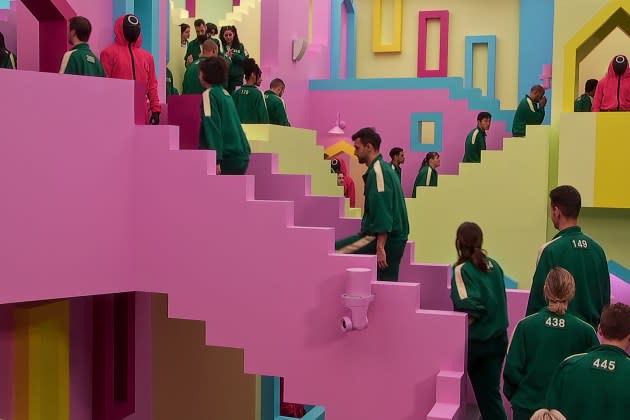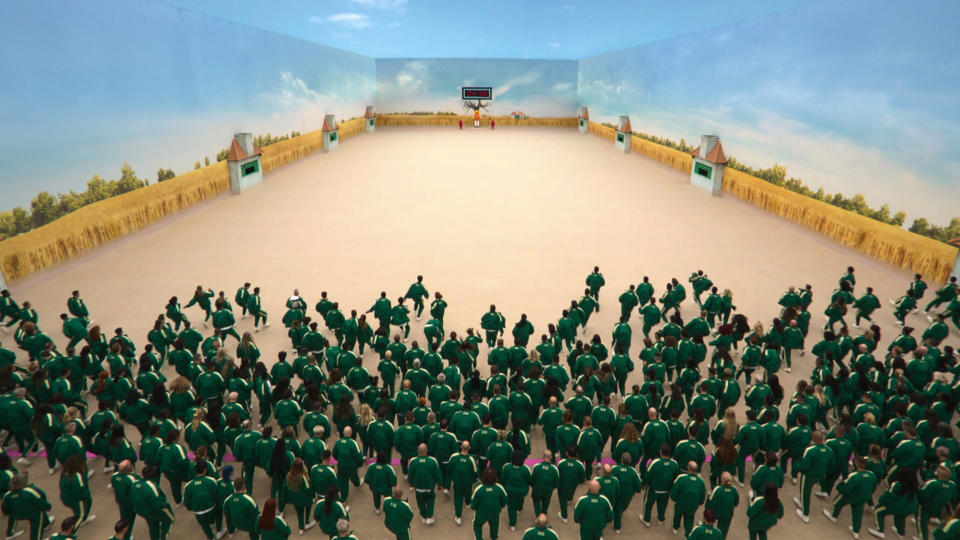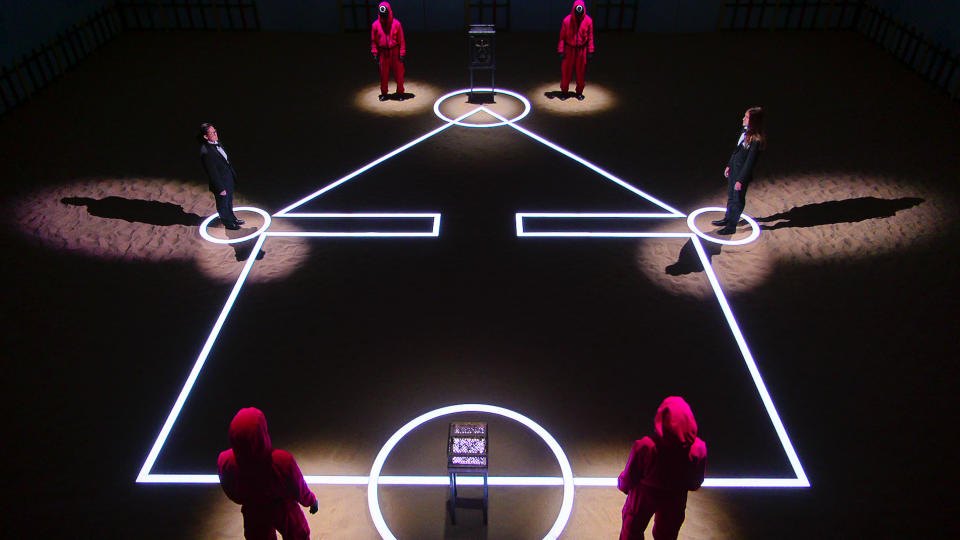‘Squid Game: The Challenge’ EP Nicola Brown On Creating A “Genuinely New And Different” Reality Competition

After the success of Squid Game, it wasn’t long before Netflix was pitched on bringing the series into the unscripted space. EP Nicola Brown says she is sure they must have been pitched many iterations of how to best bring the drama series to life, but it was production companies The Garden and Studio Lambert that were chosen to produce the series, in what she describes as a “great creative marriage.”
Based on the popular South Korean series Squid Game, the unscripted series brings together 456 players to compete for $4.56 million in a series of games – some taken from the scripted series and some new. Squid Game: The Challenge boasts both the largest cast, as well as the largest single cash prize, in reality TV history. Not only was it important for there to be new games as well as returning games from the series, but Brown says an essential part of the unscripted series were the moral dilemmas presented within the dormitories.
More from Deadline

DEADLINE: What was casting like for this show?
NICOLA BROWN: Casting was an incredible undertaking. I mean, I don’t think anything had ever been attempted at this scale before. If you’ve worked in TV for a long time, it’s quite rare that you tackle something which feels genuinely new and different, but the casting of Squid Game: The Challenge was something that none of us had ever attempted at this scale before. People had obviously seen Squid Game and fallen in love with it, and they came in droves all wanting to take part in the unscripted version. We had brilliant teams working tirelessly to sift through a huge amount of applications and we spent a lot of time then going through the short list of candidates and thinking, ‘Is this someone who we could see take part in the unscripted show?’ What I think is really, really unusual about it is the attrition rate. Obviously, you start off with 456 players, but at the end, only one is going to walk away the winner. That is really unusual in terms of making, but also in terms of producing. When you approach many reality shows as a viewer, you think, ‘This person’s got something, they could do quite well.’ But in this, as producers, we had absolutely no idea which of those 456 people would make it to the end. We had absolutely no idea who was going to win, and I think that brought a real authenticity to it for the players, because anybody can win. For us on the other side of the cameras, we had to be quite sophisticated in terms of how we filmed all of the characters, because anybody could be eliminated at any moment.

DEADLINE: It sounds like an interesting challenge, because on the one hand you want to show personal stories like in any competition. But on the other hand, more than half the players got eliminated in the first challenge, so how many people’s stories can you show without giving away who will make it further than everybody else?
BROWN: I know, and it was really interesting because there were some absolutely amazing people who were on the line for “Red Light, Green Light”, and as they progressed through the game, I’d be sitting, watching and thinking, ‘Oh no, not him. I really like him… and they’re gone.’ In a funny way, it was actually quite refreshing. We were thinking along the lines of Game of Thrones, for example, they have The Red Wedding and half the cast that you fall in love with just disappears. Actually, there were some parallels in this, I suppose, because like I said, at any point anybody could go. From a producing point of view, it was really, really challenging, and certainly when it came to the edit to make sure that we were able to weave those stories through that there were people that you would fall in love with, people that you would see eliminated, and then to thread stories through to the finals was a huge challenge given just the size of the cast that we had.
DEADLINE: Tell me about choosing the games for the unscripted series.
BROWN: We had a mix of games from the scripted series and some new games, and then we also introduced what we referred to as the “dorm twists”. We wanted to create a space where we could give the players real agency, where they could experience moral dilemmas like the ones that you see in the drama. Now, obviously in the drama, people are going to quite extreme ends and dispatching each other. Obviously, we’re not doing that in the unscripted, but we wanted a space where we could look at what decisions people would make under pressure.
Our tagline for the show was, “How you play is who you are.” So, there was something ultimately character revealing and revealing of human nature, in and of itself, about how people decided to play the game. Would they buddy up with people? Would they go it alone? What was the best strategy for that? Would they betray people who they’d become really good friends with? Would they play an honorable game? All of those questions were posed in the drama, but we just had to find a different way of doing it in our series.
For the actual games, quite often they were expecting a particular game to come up, so we wanted to wrong foot them at times. There was a point at which they got into teams and a lot of people thought, ‘This is going to be when we play tug of war,’ which is effectively a game of strength, and they actually played a new game, which was warships. So, we wanted to be able to surprise both the viewers and also the players who, let’s be honest, when you’re playing for $4.56 million, you’re going to do your homework and you’re going to watch those games on Squid Game.
DEADLINE: Speaking of throwing them off, how did you arrive at rock paper scissors for the finale?
BROWN: We talked a lot about what would be a fitting end game, and we had lots of different ideas. Should it be something huge, should it be something small? But in the end, it came down to two people facing off, and we wanted there to be an element of being able to read the other person and for the game to become increasingly psychological as they go through. So, when it came down to it, it just felt fitting that it was going to be decided with just two people staring each other in the face and trying to predict the other player’s next move. We felt it was quite a fitting end, and I think the simplicity was quite important because we could have had another big set piece, but ultimately when you come that far, you wanted it to be one against one, rather than two people against a final game, if that makes sense. It was certainly a very, very tense day on set. We were all biting our nails in the gallery thinking, ‘Oh God, who’s going to do it? Have they picked the right key?’ It was pretty tense for us. And again, totally unpredictable. We had no idea who was going to get through, right up to the end.
Best of Deadline
Sign up for Deadline's Newsletter. For the latest news, follow us on Facebook, Twitter, and Instagram.


